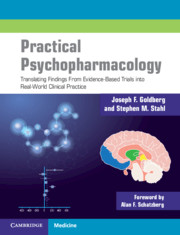 Practical Psychopharmacology
Practical Psychopharmacology from Part I - General Principles
Published online by Cambridge University Press: 19 October 2021
When someone takes a medication for depression, anxiety, or any other psychiatric problem, how do they or the prescriber know for certain if they are actually better or worse? And in either instance, whether to credit (or blame) the drug? If depression gets better 4–6 weeks after taking an antidepressant, how confidently should we attribute improvement to the drug rather than to serendipity? What if the patient gets better only after 14–16 weeks – is that too far in time to distinguish a plausible drug effect from spontaneous remission? Or, when can we assume the outcome was still a likely drug effect, given that an adequate trial may take longer in some people than others? If they felt better in just a few days, is that evidence of a placebo effect?
To save this book to your Kindle, first ensure [email protected] is added to your Approved Personal Document E-mail List under your Personal Document Settings on the Manage Your Content and Devices page of your Amazon account. Then enter the ‘name’ part of your Kindle email address below. Find out more about saving to your Kindle.
Note you can select to save to either the @free.kindle.com or @kindle.com variations. ‘@free.kindle.com’ emails are free but can only be saved to your device when it is connected to wi-fi. ‘@kindle.com’ emails can be delivered even when you are not connected to wi-fi, but note that service fees apply.
Find out more about the Kindle Personal Document Service.
To save content items to your account, please confirm that you agree to abide by our usage policies. If this is the first time you use this feature, you will be asked to authorise Cambridge Core to connect with your account. Find out more about saving content to Dropbox.
To save content items to your account, please confirm that you agree to abide by our usage policies. If this is the first time you use this feature, you will be asked to authorise Cambridge Core to connect with your account. Find out more about saving content to Google Drive.